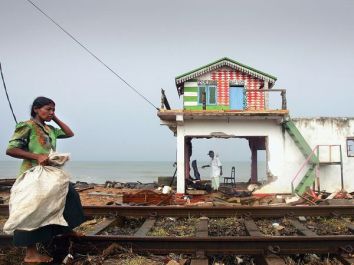Drive down the coast of Sri Lanka, and you will notice an interesting site. Consistently along the coast are ruins of houses, spaced every 100 meters or so, sometimes in clusters of 5 or 6. The walls facing the ocean are gone. Only the walls perpendicular to the ocean are left, but just barely. Even the roofs are gone. Weeds grow inside and out, nearly hiding the structures completely. But you can’t miss them. There are hundreds, probably thousands, stretching for hundreds kilometers down the southwestern coast of Sri Lanka.
These are the remnants of the Boxing Day Tsunami that stuck Sri Lanka in 2004. The brick and mortar dwellings built on the edges of the island were no match for the tsunami created by the Indian Ocean earthquake (Sumatra Earthquake) of December 26th, 2004. And neither were the residents. With no tsunami warning systems, most were taken completely by surprise. It is estimated that 35,000 people lost their lives in Sri Lanka alone.
The legacy of the disaster in Sri Lanka has been difficult to measure. Shops, houses, and hotels, even slums, have been rebuild along the coast, sometimes using the walls and foundations of the ruined buildings to save on building costs. A small memorial marks the spot where a train was overwhelmed by the tsunami as it headed from Colombo to Galle. Most of the 1500 passengers on board perished. Yet, most locals I’ve talked to seem to regard the memorial as nothing more than a not-so-popular tourist trap than anything else. Many seem to regard the tsunami as an event in history, with little relevance to the present. As the debris was cleared, shops reopened and tourists returned, people seemed eager to leave the tragic past behind and move on to a brighter future, free from the fear of the rising waters. This of course only works to invite disaster again.
What is recovery? We all need to “move on” and not wallow in the tragic past forever. Does this require us to forget the past?
Immediately following the Tohoku earthquake and tsunami that struck Japan in 2011, a delegation of Sri Lankan volunteers came to Japan to join in the relief efforts. Having experienced a similar tragedy, they were eager to share their expertise and help the Japanese work towards recovery. They had not forgotten. They acted.
Today, how will we in Japan respond to the events of two years ago? What will we choose to forget? What will we choose to remember? I choose to remember the people of Tohoku. Not only the 20,000 dead or missing, but also the living, the survivors that struggle and continue to fight strong two years later. Remembering them is the key to supporting them and avoiding such tragedies in the face of a similar disasters in the future.
For now, most of the ruins along the coast of Sri Lanka continue to stand. The reason seems quite simple. The property owners have perished in the tsunami. No one living has the right to raze or develop these properties. So they remain, visible scars of the tsunami, a constant reminder of the destruction, almost a decade ago.
http://peaceboat.jp/relief/reports/srilanka/
http://srilankatravelnotes.com/GALLE/PERALIYA/PeraliyaBuddhaStatue.html
